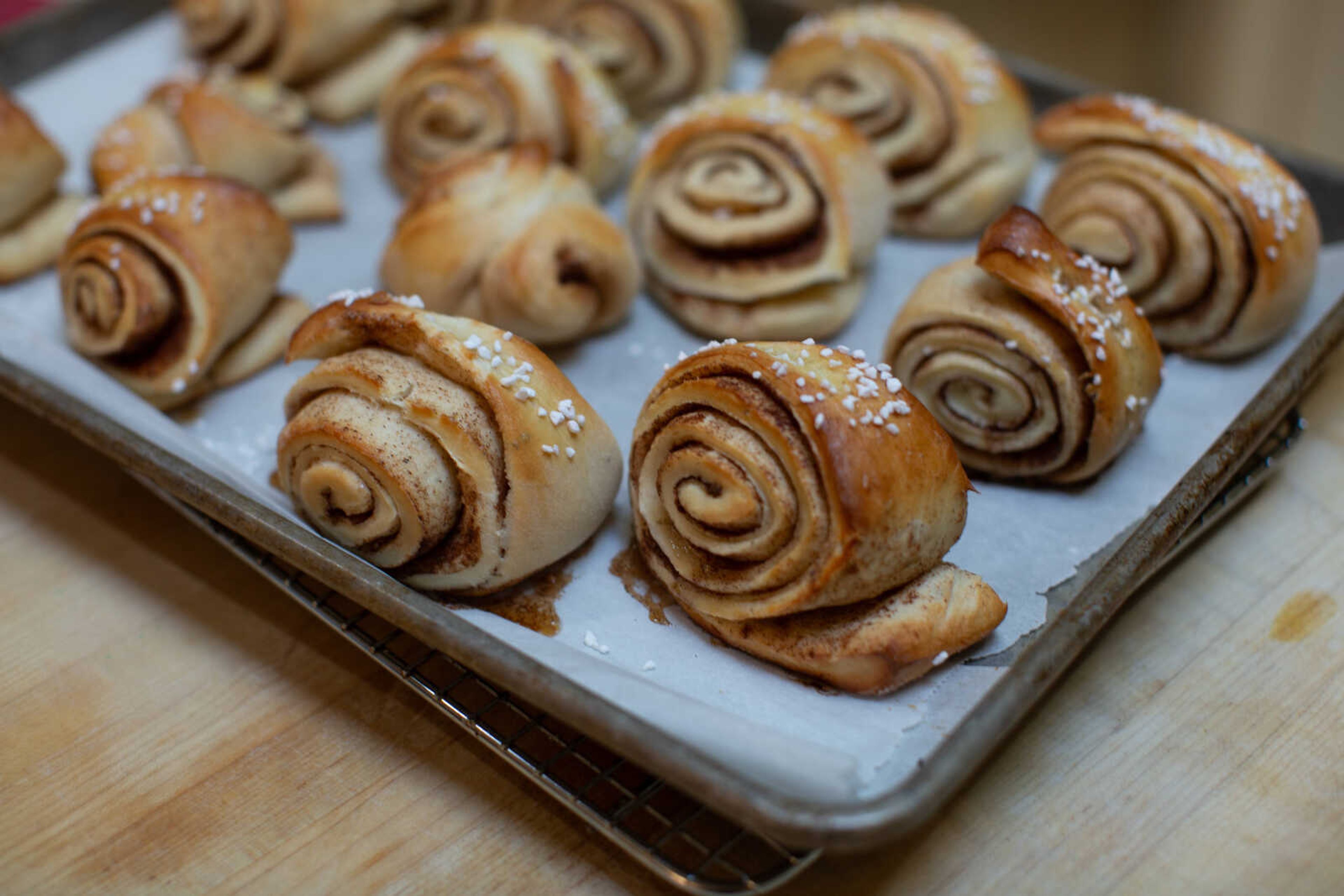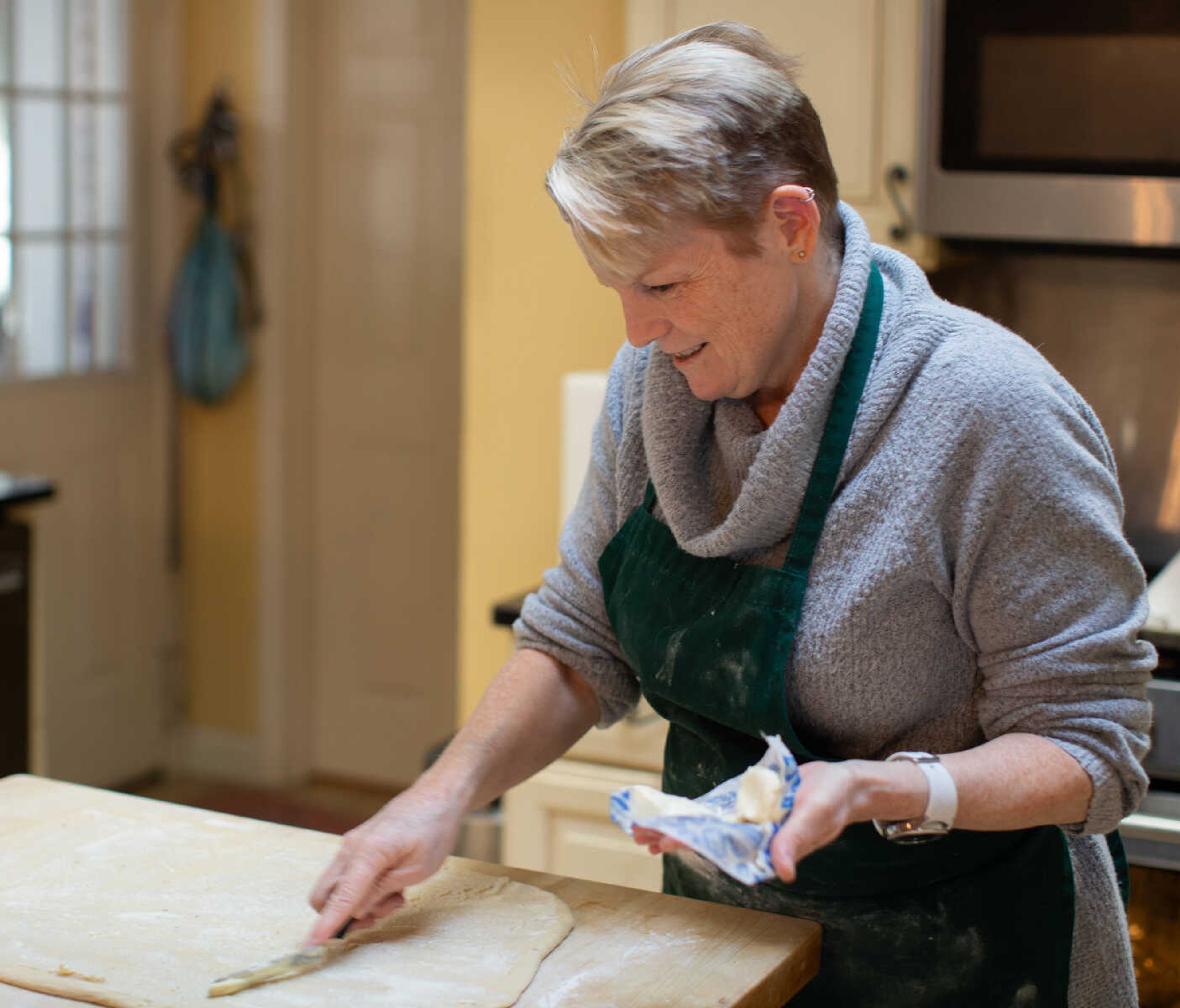Outside the Office: Baking with Dr. Toni Alexander
As a professor and chairperson of the History and Anthropology Department at Southeast Missouri State University, Dr. Toni Alexander says much of her day-to-day work does not end with something tangible. The few “tangible” results in her job — students graduating, papers being published and other academic projects — require ample time and patience...
As a professor and chairperson of the History and Anthropology Department at Southeast Missouri State University, Dr. Toni Alexander says much of her day-to-day work does not end with something tangible. The few “tangible” results in her job — students graduating, papers being published and other academic projects — require ample time and patience.
Alexander loves baking because she is able to create something tangible in a relatively short time frame. Baking is simple, therapeutic. And the best part is it doesn’t require any paperwork.
“I put these ingredients together and at the end of the day, there’s hopefully something tasty and something I can share with other people that doesn’t involve filling out a form,” Alexander said.
Alexander says she technically began her journey with baking as a child growing up in Northern California. Her grandmother worked in restaurants and taught Alexander how to bake pies from scratch, but Alexander says she didn’t fully immerse herself in the world of baking until she took a break from college to live in Finland for one year as a participant of the International Christian Youth Exchange.
In Finland, Alexander’s host family baked bread and Finnish treats at least once a week. She attributes this rich culture of baking to Finland’s high coffee consumption. According to Culture Trip’s 2021 article “Why Finland Drinks More Coffee Than Any Other Country,” Finnish people consume more coffee per capita than any other nation in the world with the average individual drinking eight to nine cups of coffee a day.
“The British have tea in the afternoon, the Finns drink coffee,” Alexander said. “Even on birthdays, people will host a coffee for you. The tradition is you’re supposed to offer seven different things to go with the coffee. It could be a roll and cake and sandwiches … it’s just that ingrained [in the culture.]”

Every afternoon Alexander says she would arrive home from school and her host mother would sit down with her to have coffee. There would always be a little slice of bread or treat to go with the coffee, such as Korvapuusti, which is a cardamom dough rolled out and made into cinnamon rolls. She now makes this treat often for her family and friends. To create the traditional shape of this pastry, Alexander pushes her thumb into the center of the cinnamon rolls; she jokes that this technique gives them “ears.”
Alexander uses a recipe for Korvapuusti that she found in a Finnish cookbook at Costco shortly after she returned from Finland as a young adult. Throughout undergraduate school, Alexander utilized the skills she learned from baking with her host family in Finland and regularly made bread and treats by hand; as a graduation present, Alexander’s parents gifted her a Kitchen Aid mixer. Although Alexander loves how the mixer can streamline her baking process, she still prefers to knead new recipes by hand so she can get a feel for the dough’s texture.
“The longest thing that took me is to have confidence … and that you don’t just keep adding flour ‘cause then you end up making bricks,” Alexander said.
Alexander moved from her previous position as a tenured professor at Auburn University in Auburn, Alabama, to her chairperson position at SEMO in June 2014. Shortly after moving, she signed up for Rev. Bob Towner’s sourdough bread course at the Cape Career and Technology Center where she created her own sourdough starter and refined her baking skills. Ten years later, the sourdough starter she made in class is still in her fridge.
She says she only has to “feed” this sourdough starter about once every month; “feeding” is when one pulls the mixture out of the fridge, lets it warm to room temperature before adding flour and water to it. This helps keep the fermented culture of flour and water alive and boosts its metabolic processes, thereby retaining the distinct flavor of sourdough.
“I know people who say, ‘Hey! I got your [sourdough] starter, I got it from so and so.’ It is apparently the taste of Cape,” Alexander said. “I grew up with San Francisco sourdough and it has a very distinct flavor but you’re never going to get that outside of San Francisco ‘cause it’s based on wild yeast there. It’s always going to be a little different ‘cause the bread is going to taste like where you are.”
Alexander taught her husband how to make sourdough bread and together they baked countless loaves of it to sell at Christ Episcopal Church’s stand at Cape Girardeau’s Riverfront Market. The proceeds from the bread went back to helping their church’s Hunger Ministries, a ministry that provides nourishment for the community through the Red Door Food Pantry and free monthly meals. Christ Episcopal Church still has the Hunger Ministries but after the pandemic, Alexander says the church stopped baking bread to sell at the farmer’s market.
Alexander still bakes something weekly, whether it’s bread for her family or treats for her faculty, church members and friends. She loves experimenting and is always open to requests. She has made vegan cinnamon rolls, Pan de Muertos, Bunuelos, white fluffy rolls, King cake, shortbread, sourdough, white and whole wheat sandwich bread, Dutch Crunch Bread, among many other breads and treats. Alexander enjoys trying recipes from around-the-world, but she sticks mostly to European recipes since they are what she is most familiar with.
She says the hardest recipes are typically the simplest ones with the fewest ingredients. For example, she says making French baguettes or Italian ciabatta can be “hit or miss” for her. Sometimes the baguettes come out of the oven perfect, crispy and beautiful, just like you’d see in a picture; other times the baguettes come out flat and deformed. Usually, they still taste good — which is what matters most.
Alexander loves how baking can bring people together similar to the way language connects us. She says she can still speak some Finnish from her time abroad, but she isn’t fluent — Finnish is an extremely difficult language for English speakers to pick up since it is not one of the Germanic languages. There are also no articles in the Finnish language, no words for “the” or “a.”
She later went back to Finland to teach at an English language camp. During a conversation while she was there, Alexander spoke in Finnish to a group and meant to say “I’ve met him” but instead she said “I’ve killed him”; the Finnish words for “to meet” and “to kill” sound very similar, but pronouncing every syllable correctly is important in Finnish — it’s a “very phonetic language,” Alexander says. The group laughed about her mistake together.
Alexander says people should not be afraid of making mistakes when learning a language, because it’s bound to happen. Mistakes are just proof that one is growing. And the same goes for baking bread, another language Alexander is continuing to practice.
“It’s hit or miss, sometimes it [the bread] likes me, sometimes I’ve ‘met it’ and sometimes I’ve ‘killed it’,” Alexander said. “But like I tell my students [with language learning], you have to be comfortable with being uncomfortable.”
Connect with the Southeast Missourian Newsroom:
For corrections to this story or other insights for the editor, click here. To submit a letter to the editor, click here. To learn about the Southeast Missourian’s AI Policy, click here.






